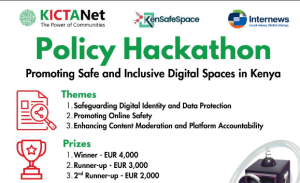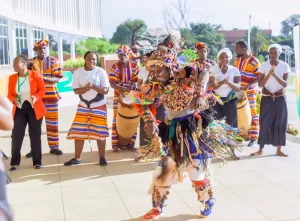In Kenya, technology-facilitated gender-based violence (TFGBV) has become a growing concern, particularly with the widespread adoption of digital platforms. Women, girls, and persons with disabilities (PWDs) are disproportionately targeted with cyber harassment, doxxing, non-consensual image sharing, hate speech, and other forms of online violence.
Despite the increasing prevalence of these violations, there remains a significant gap in language and terminology to effectively identify, report, and respond to TFGBV, particularly in local languages.
To bridge this gap, KICTANet is developing this multilingual lexicon with the support of the UK Government’s Digital Access Programme through the British High Commission in Nairobi.
This initiative is in collaboration with various stakeholders to ensure that technology-facilitated gender-based violence (TFGBV) is effectively addressed in Kenya’s diverse linguistic landscape.
Speaking on the significance of this initiative, Dr. Grace Githaiga, CEO at KICTANet, emphasized:
“The goal is to inform policy development, enhance awareness, and improve platform moderation mechanisms. By understanding the language and cultural nuances that contribute to TFGBV, this lexicon will help identify, report, and respond to the various forms of online abuse affecting women, girls, and persons with disabilities (PWDs), especially in marginalized regions.”
Many victims and communities struggle to describe and articulate their experiences due to the lack of appropriate terms in Swahili, Luo, Kikuyu, Kamba, Somali, and Luhya. This linguistic gap not only affects survivors’ ability to report abuse but also limits law enforcement, policymakers, and tech platforms’ ability to take action.
Additionally, perpetrators often exploit these language gaps, using coded language, euphemisms, and culturally specific slurs that evade detection by platform moderation tools.
By developing a comprehensive, multilingual lexicon, KICTANet seeks to:
a) Bridge the language gap in addressing TFGBV by capturing localized and nuanced terms used in digital harassment.
b) Enhance digital safety and awareness by equipping communities with the vocabulary to recognize and report online abuse.
c) Support policymakers and tech platforms in developing effective response mechanisms, moderation tools, and digital rights protections.
d) Improve platform accountability by ensuring that technology companies recognize and act against gendered hate speech and harassment in local languages.
Kenya’s rich linguistic diversity must be acknowledged when tackling digital gender-based violence, ensuring that no survivor is left unheard due to language barriers. This lexicon will serve as a crucial tool in promote safer, more inclusive digital spaces, especially for marginalized and vulnerable communities.
Cherie Oyier, Programme Officer at KICTANet, further highlighted the impact of this work:
“This lexicon will not only serve as a tool for advocacy and education but also shape policies to tackle TFGBV more effectively.”
By working together, we aim to enhance policy development, awareness, and platform moderation mechanisms, ensuring that victims of online GBV can report cases and seek redress without language barriers. This project is a crucial step toward creating safer digital spaces for Men, women, girls, and persons with disabilities (PWDs) across the country.
By Neema Mujesia, Communications officer at KICTANet.
![]()





Thanks
Gender Based violence has been common in our country and I thank Kictanet and ACWICT because of the efforts they are coming up with to empower girl child with digital skills and entrepreneurial Skills and also agricultural skills for them to be independent.
I would like to impact change in my locality about conducting a crusade in my county to empower women and girls .